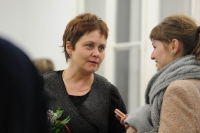“And I can’t even imagine it as real, that they just take everything you see and have, and not even the situation where they actually forced you to go somewhere with one suitcase.“
Emöke Vargová is a successful and enterprising woman from artistic waters, belonging to the Hungarian minority living in Slovakia. She was born on July 29, 1965, in Dunajská Streda, to a mixed couple Zoltán and Mária Varga. Father Zoltán, was of Hungarian nationality and was born in Kráľovičove Kračany, where he and his family belonged to the Hungarian minority. Her father was very proud of his nationality and wanted for Emöke to attend only hungarian kindergartens and schools. Her mother Mária intervened against this, realizing that they lived in Slovakia and it would not be suitable for her future. Thanks to her, the memorial learned the Slovak language, but after one year in kindergarten. Emöke’s mother, on the other hand, was of Slovak origin, but she was born in Hungary, specifically in Vácegres, where she belonged to the Slovak minority. In the Varga’s family was born another daughter, Alica, Emöke’s older sister. The memorial graduated from a nine-year primary school in Dunajská Streda, during which she was considered a hyperactive child, but who was not sociable. Her mother told her that her favorite activity from her childhood was, for example, tearing paper into small pieces or playing on a children sand pit, where she entered only after she expelled all the other children. These her characteristic features have already revealed something about her future direction. In 1980, she began attending the Secondary School of industrial art, in Bratislava, which was located on a beautiful historic street, Palisády. However, this school was her second choice, as her first idea was a pedagogical secondary school, but later she changed her mind. In accordance with her own words, she knew nothing just art, it was quite logical that after successfully graduating from high school in 1984, her next choice was the Academy of Fine Arts in Bratislava. Her admission was preceded by talent exams, for which she was prepared thanks to good training from high school. Emöke was accepted to the Department of Painting, specifically monumental painting, and began with teachers such as Lehotská and Fila. She graduated from university in 1991, followed by a short break and achievement of scholarships abroad. Until the revolution, college times were cruel for art school students. The memorial remembers that one of her teachers started each class, with the opening of the Art History book, and remarked, “And now show me where a woman is in art history.” She was greatly affected by this period and the social woman became a very closed person. She was most grateful to teacher Fila, who trusted her after the revolution and helped her get out of the cramp into releasing. In 1992, thanks to him, she won the Martin Benka Award. It was followed by other successes. She became the winner of the competition “Young Slovak Artist of the Year - Tonal 1999” or the finalist of “Young Slovak Artist of the Year 1998”. When Emöke successfully completed her university studies in 1991, she returned home to Dunajská Streda. As she had little choice, she initially did advertising things, exhibited works in the studio and restored with a friend for about two years. In 1997, the memorial became an assistant professor of drawing at the Department of Painting and Other Media, at the Academy of Fine Arts in Bratislava. It was her first major and official job, in which she has remained to this day. While working at the university, she was allowed to take part in several internships abroad. The most significant were spent in Switzerland in 1995, where Emöke returned for more than three years, and in 1999 in the USA, where the internship lasted three months. Whereas she had the conditions for her work in Slovakia, she did not consider starting a new job abroad. At present, in addition to being a teacher at university, she also exhibits her works throughout Slovakia and takes painting courses for adults. As regards her privacy, she had a serious relationship in Switzerland, but as it suited him that Emöke always spent some time with him and then again at home in Slovakia, she ended it with him. For complete happiness she missed a child, and she commented: “My greatest work is my daughter.” Laura was born in 2005 and she is fifteen years old. Unfortunately, she didn’t inherit much from her mother’s talent, and her surroundings feel that she will choose an acting career. Considering the working circumstances, Emöke gave birth in April, and by June she had to return to work to make a selection procedure. She couldn’t afford to lose her job, she would lose everything. Because of the current corona crisis, she is glad that she has some work to do, compared to the rest of the population. As she works in the state sphere, at least she will not lose everything, but she also loses part of her earnings from exhibitions. Emöke’s life motto is to surround yourself and be with the people who you love, to be happy and to handle completely ordinary things with ease.
